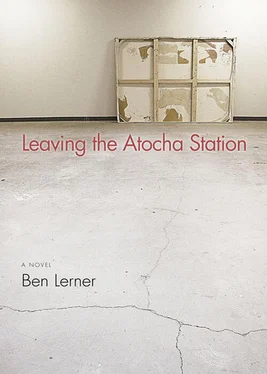Whenever I was with Teresa, whenever we were talking, I felt our faces engaged in a more substantial and sophisticated conversation than our voices. Her face was formidable; it seemed by turns very young and very old; when she opened her eyes wide, she looked like a child, and when she squinted in concentration, the tiny wrinkles at their outer corners made her seem worldly, wise. Because she could instantly look younger or older, more innocent or experienced than she was, she could parry whatever speech was addressed to her. If you were to accuse her, say, of reading too much into a particular scene in a movie, she would widen her eyes and look at you with an innocence that made you feel guilty of projection; if you accused her of some form of naiveté, her squint would bespeak such expanses of experience that the accusation was instantly turned back upon you. Her eyes could deflect or reflect or ironize, and then her smile, which was wide, would instantly restore a tabula rasa, benevolently forgiving any claim against her.
I believed the dialectical movement of her face, however, was challenged by our particular circumstance; I never spoke English with Teresa, not since the first night of our meeting when my volubility had swelled. I told her that this was to promote my acquisition of Spanish, but it was, in fact, to preserve the possibility of misspeaking or being misunderstood, and to secure and amplify the mystery of that inaugural outburst. I believed my rant on the way to Rafa’s party had impressed her, and I was determined not to ruin it with banalities. With my performance in the car her sole sample of my English, I hoped she would always translate my fragmented Spanish in her head, transforming my halting and semicoherent utterances into the most eloquent English she could imagine. She would not, like Isabel, merely intuit depths, but would actually sound them in her painstakingly mastered second language. Of course she would never arrive at a satisfactory English formulation of whatever my Spanish negatively figured, but this would further preserve the mystique of my powers in my mother tongue. Such conversations would be the counterpoint to her ongoing work with Arturo of translating my poems, work she had almost entirely taken over; there she tried to imagine every possible Spanish correlative to my English, such as it was; here, she tried to extract from my remedial Spanish the poet’s native eloquence.
As a result of these interpretations and projections, Teresa, during our conversations, was often at a loss as to what to do with her face, or at least her facial machinations were delayed; the widening and squinting of her eyes was more in response to her own internal ruminations, to what she imagined I would have said, than it was to my actual speech. I was therefore able to raise an eyebrow and communicate that I was watching Teresa attempt to translate whatever I had said, or rather, failed to say, and thus my face reclaimed from her face the powers of metacommentary. And yet as we spent more and more time together, I found myself avoiding her eyes, because when I looked at or into them, I believed I saw she saw right through me. Or I saw her see herself reflected in my eyes, saw that she knew, or was coming to know, that what interest I held for her, all of it, was virtual, that my appeal for her had little to do with my actual writing or speech, and while she was happy to let me believe she believed in my profundity, on some level she was aware that she was merely encountering herself. This anxiety was characteristic of my project’s fourth phase.
One afternoon Teresa and I saw Citizen Kane, which was playing at El Circulo Bellas Artes, then had some chalky white wine at an adjacent sidewalk café. After making various ambiguous pronouncements about cinema, but experiencing Teresa as unusually distracted, I decided to make my confession.
“I told you before,” I said slowly, “that my mother was dead. This isn’t true.”
“What?” she asked, suddenly interested, but not sure she’d understood.
“I told you my mom was dead, but my mom is alive,” I said.
“Oh. I had assumed,” she said, smiling, “that you were just drunk and high and homesick and wanted some attention.” Then she leaned over and started twirling my hair and said in English, “You have a poetic license.”
I blinked at her, first surprised not to feel relief, then surprised to feel an intense anger rising, as though my mother were in fact deceased and now she was calling me a liar. “I didn’t want attention. I didn’t have homesick,” I said, my gravity cancelled by my grammar. She opened her eyes wide as I pulled away from her but said nothing, awaiting my explanation. As one part of me insisted to some other part of me that this was wonderful, a reprieve, that I could let go of my guilt and laugh about it with Teresa, I heard myself proclaim, “My mom is sick. And because—” I pretended it was difficult to go on. The smile drained quickly from her face. “I am scared … I was trying to imagine …” Her eyes grew a little wider. “I thought if I said it, I would have less fear.”
“What is she sick with?” Teresa asked, which I experienced as insensitive, maybe because, while she had stopped smiling, her voice wasn’t any more tender than usual, or maybe because she was interrupting my presentation. I signaled for the check, although our drinks were far from finished, then regretted signaling.
Not wanting to name a particular disease for fear of somehow condemning my mother to suffer it, I ignored the question. I reached out and touched her arm, a gesture out of character for me. “I have felt horrible about the lie. I’m sorry.” Withdrawing my hand, but leaving it on the table nearly touching hers, I explained, “I came here and nobody knows me. So I thought: You can be whatever you want to people. You can say you are rich or poor. You can say you are from anywhere, that you do anything. At first I felt very free, as if my life at home wasn’t real anymore.” I downed my warming wine. “And I was glad to be away from my father.”
While I believed the speech was working in the sense of convincing Teresa my mom was ill, or at least entreating her to suspend her disbelief, I also sensed a lack of translation, that Teresa was experiencing me as merely inarticulate. I barely resisted the temptation to wax eloquent in English, but realized my actual English was nothing compared to her image of it.
“My father,” I said, “is basically a fascist.”
“What do you mean by ‘fascist’?” she said. Nobody, at any stage of my project, had ever asked me what I meant by “fascist” or “fascism.” I felt the anger again.
“He is a man of right — wing politics,” I said, meaninglessly. “He only respects violence.” As I said this, I thought of my dad patiently trying to get a spider to crawl from the carpet onto a piece of paper so he could escort it safely from house to yard.
“But your mom is a feminist,” she said in a voice suspiciously free of all suspicion. I’d no memory of discussing my mother’s politics with Teresa.
“Yes, and publicly so is he,” I said, implying everybody knew that fascists marry feminists in order to evade detection. “And what do you mean by ‘feminist’?” I threw in. She just smiled ambiguously.
The check arrived. I overpaid with large euro coins, which always struck me as particularly fake, and we stood to leave; it was rare for me to pay for anything with Teresa. We walked in the direction of El Retiro. The nicotine and white wine mixed nicely with the light and still — tentative warmth and I felt confident as we walked that Teresa would give me, if nothing else, the benefit of the doubt, and I remembered, in order to buttress this belief, the time I had been stern with her at the reading and she had seemed genuinely hurt. Young women were testing their new dresses, teenagers were skateboarding in the plazas, failing again and again to land their kickflips, and we saw ourselves reflected vaguely in the silver of passing buses. I was surprised to find myself taking Teresa’s hand, although I did so with the faintest trace of irony, implied, at least potentially, in the childish way I slightly swung our arms; if the intimacy were unwelcome, she would dismiss it as frivolity. At the same time I was careful to communicate, mainly with my pace, that if I was acting unburdened and optimistic it was to cover the great sadness arising from the situation with my family. I was probably aided in this representation of concealed suffering by the guilt that was beginning to spread through me, displacing nicotine and wine; it was not yet causing pain, but it was positioning itself everywhere in my body, lying in wait till evening.
Читать дальше












